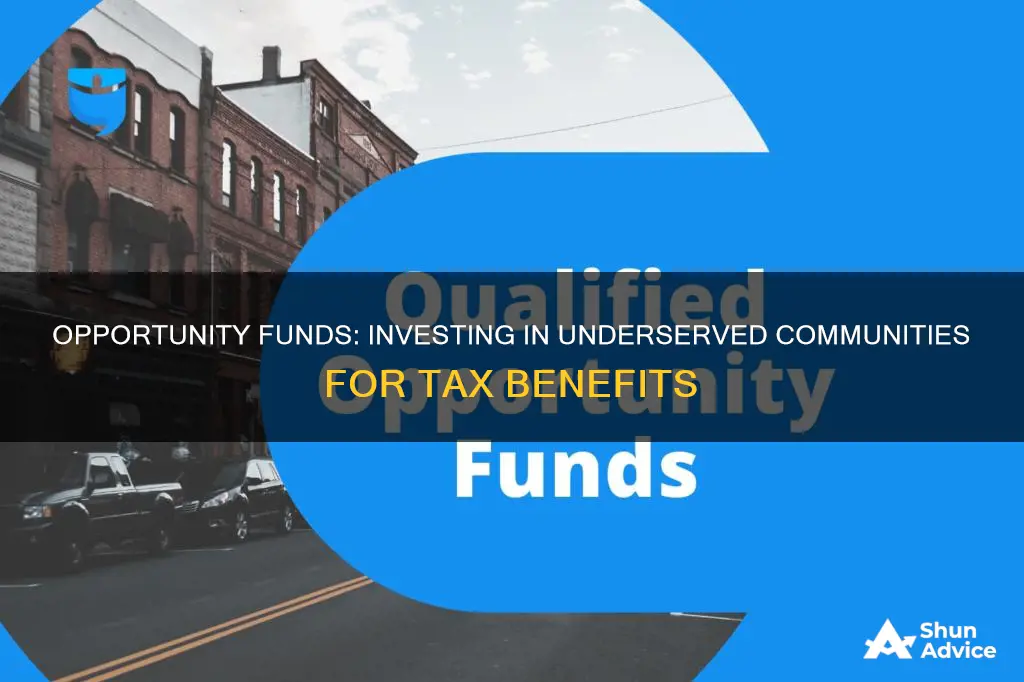
Opportunity funds are investment vehicles designed to invest in real estate or business development in economically distressed areas known as opportunity zones. These funds arose from the 2017 Tax Cuts and Jobs Act, which incentivises investors to put their money into low-income areas in the US by offering tax benefits. Investors can defer their tax payments on prior investment gains if those gains are then invested in a qualified opportunity fund within 180 days of the sale. Taxes are then deferred to either the day when the opportunity fund investment is sold or exchanged, or December 31, 2026 — whichever comes first.
What You'll Learn
- Opportunity funds are for investing in real estate or business development in economically distressed areas
- Opportunity funds arose from the creation of opportunity zones as part of the 2017 Tax Cuts and Jobs Act
- To qualify, opportunity funds must make “substantial improvements” to properties, investing at least the original value paid
- There are tax advantages to investing in opportunity funds, including the ability to defer taxation of previous gains
- Opportunity zones can be found in all 50 US states, Washington, D.C., and US territories

Opportunity funds are for investing in real estate or business development in economically distressed areas
Opportunity funds are investment vehicles designed to invest in real estate or business development in economically distressed areas, known as "opportunity zones". These areas are subject to different economic regulations and offer tax incentives for investments, including delayed and reduced taxes on capital gains.
The opportunity funds arose from the creation of opportunity zones as part of the 2017 Tax Cuts and Jobs Act (TCJA). To qualify as an opportunity zone, a community must be designated by the state and certified by the secretary of the US Treasury via the Internal Revenue Service (IRS). These zones can be found across all 50 US states, Washington, D.C., and US territories like Guam, Puerto Rico, the Virgin Islands, and the Northern Mariana Islands.
To become a qualified opportunity fund, an investment fund created by a corporation or partnership must file IRS Form 8996 with their federal income tax return. Once qualified, the fund must invest at least 90% of its assets in designated opportunity zones to receive preferential tax treatment.
Opportunity funds must make substantial improvements to the properties they invest in. According to the TCJA, substantial improvements refer to investments in the property that match or exceed the original value paid by the fund. These improvements must be made within 30 months of the initial investment. Certain types of businesses cannot be included in opportunity funds, even if they are located within opportunity zones, such as gambling facilities, country clubs, massage parlours, and liquor stores.
By investing in opportunity funds, investors can defer their tax payments on prior investment gains if they reinvest those gains in a qualified opportunity fund within 180 days of the sale. These deferred taxes are then pushed back to either the date when the opportunity fund investment is sold or exchanged, or December 31, 2026, whichever comes first.
The longer an investor holds their qualified opportunity fund investment, the more their tax burden may decrease:
- If held for more than five years, investors receive a 10% exclusion of the deferred gain on their investment.
- If held for more than seven years, investors receive a 15% exclusion.
- After 10 years, investors do not owe federal income taxes on the fund's appreciation by the date of sale.
Norway Oil Fund: A Guide to Investing Wisely
You may want to see also

Opportunity funds arose from the creation of opportunity zones as part of the 2017 Tax Cuts and Jobs Act
The program encourages investors to put their money in Qualified Opportunity Funds, which are investment vehicles that invest in real estate or business development in opportunity zones. These funds are set up by US partnerships or corporations and must invest at least 90% of their assets in designated opportunity zones to receive preferential tax treatment.
By investing in Qualified Opportunity Funds, investors can defer and potentially reduce their existing capital gains tax liability. They can also completely eliminate all capital gains tax liability from future value appreciation on Qualified Opportunity Zone investments.
To qualify for capital gains tax deferral, investors must invest in a Qualified Opportunity Fund within 180 days of selling the assets that generated the gains. The amount of time an investment is held in a Qualified Opportunity Fund determines the tax benefit received. If an investment is held for at least five years, the investor's basis (the amount of their investment) will increase by 10% of the deferred gain. If held for at least seven years, the basis will increase by an additional 5% of the deferred gain. If the investment is held for at least 10 years, the investor may be able to permanently exclude gain resulting from a qualifying investment when it is sold or exchanged.
Mutual Funds: Lousy Long-Term Investments, Here's Why
You may want to see also

To qualify, opportunity funds must make “substantial improvements” to properties, investing at least the original value paid
To qualify as an opportunity fund, certain criteria must be met. These funds are a product of the 2017 Tax Cuts and Jobs Act (TCJA) and are designed to encourage investment in low-income, distressed communities. To qualify, opportunity funds must make "substantial improvements" to the properties they invest in. This means that they must invest an amount equal to or greater than the original value of the property within 30 months of purchase. For example, if a property is purchased for $700,000, the opportunity fund must invest at least $700,000 worth of improvements within 2.5 years.
These "substantial improvements" are necessary for the fund to qualify for preferential tax treatment. The purpose of opportunity funds is to rehabilitate economically distressed areas, so it is expected that funds will continue to invest in the improvement of properties. This can be achieved by investing in new construction or by substantially rehabilitating existing properties.
It is important to note that certain types of businesses cannot be included in opportunity funds, even if they are located within designated opportunity zones. These excluded businesses include racetracks, gambling facilities, liquor stores, golf courses, country clubs, massage parlours, and hot tub and suntan facilities.
Opportunity funds provide investors with tax advantages and benefits, such as the ability to defer taxation on previous gains and potentially reduce their tax burden over time. The longer an investor holds their qualified opportunity fund investment, the more their tax burden may decrease. After holding the investment for five years, investors receive a 10% exclusion of the deferred gain, and after seven years, they receive an additional 5% exclusion, resulting in a total of a 15% exclusion.
Additionally, if an investor holds their investment in a qualified opportunity fund for at least 10 years, they may be able to permanently exclude gains resulting from a qualifying investment when it is sold or exchanged. This means that after a decade, the cost basis of the property becomes equal to the fair market value on the date of sale or exchange, resulting in no federal income taxes owed on the fund's appreciation.
Equity Income Funds: Smart Investment for Steady Returns
You may want to see also

There are tax advantages to investing in opportunity funds, including the ability to defer taxation of previous gains
Opportunity funds are investment vehicles designed to encourage economic growth in areas known as "opportunity zones". These zones are designated as economically distressed or low-income areas. The funds facilitate investment in these areas by offering investors tax advantages, such as the ability to defer taxation on previous gains.
The opportunity fund programme was established by the 2017 Tax Cuts and Jobs Act. To qualify as an opportunity fund, an investment fund must be designated as such by filing IRS Form 8996 with their federal income tax return. Once designated, the fund must invest at least 90% of its assets in opportunity zones to receive preferential tax treatment.
Investors can defer their tax payments on prior investment gains if those gains are then invested in a qualified opportunity fund within 180 days of the sale. Taxes are then deferred until either the day when the opportunity fund investment is sold or exchanged, or December 31, 2026—whichever comes first.
Beyond the ability to defer taxation on previous gains, the longer a participant holds their qualified opportunity fund investment, the smaller their tax burden may be. If an investment is held for more than five years, investors receive a 10% exclusion of the deferred gain on their investment. If an investor holds for more than seven years, they receive a 15% exclusion. After 10 years, the investor does not owe federal income taxes on the fund's appreciation by the date of sale.
Bond Index Funds: A Smart, Diversified Investment Strategy
You may want to see also

Opportunity zones can be found in all 50 US states, Washington, D.C., and US territories
Opportunity Zones are communities that have been nominated by the state and certified by the Treasury Department as qualifying for the Opportunity Zone program. They are designated by the state and certified by the secretary of the U.S. Treasury, via the Internal Revenue Service (IRS).
The Opportunity Zone program was established by the 2017 Tax Cuts and Jobs Act to provide tax incentives for private, long-term investment in economically distressed communities. These communities must be low-income areas, with a minimum poverty rate of 20% or a median family income of less than or equal to 80% of the statewide median family income.
The program offers significant tax incentives to encourage investment in these areas. Investors can defer their tax payments on prior investment gains if they invest those gains in a qualified opportunity fund within 180 days of the sale. They can also reduce their existing capital gains tax liability and completely eliminate future capital gains tax liability on Qualified Opportunity Zone investments.
To qualify as a Qualified Opportunity Fund, an investment fund must be designated as such by filing IRS Form 8996 with their federal income tax return. The fund must then invest at least 90% of its assets in designated Opportunity Zones to receive preferential tax treatment. These funds facilitate investments in Opportunity Zones, helping to rehabilitate these regions while providing investors with tax advantages and benefits.
Discretionary Funds: Investment Power in Your Hands
You may want to see also
Frequently asked questions
An opportunity fund is an investment vehicle designed to invest in real estate or business development in areas known as "opportunity zones". Opportunity zones are designated as economically distressed areas and are subject to different economic regulations than other regions.
Opportunity funds offer tax incentives for investments in opportunity zones, including delayed and potentially reduced taxes on capital gains. The longer an investment is held in a qualified opportunity fund, the smaller the tax burden may be.
To receive the benefits of the opportunity fund program, investors must invest in an opportunity fund within 180 days of the sale of the assets that generated capital gains. Opportunity funds can be created by investors or they can invest in existing opportunity funds.







